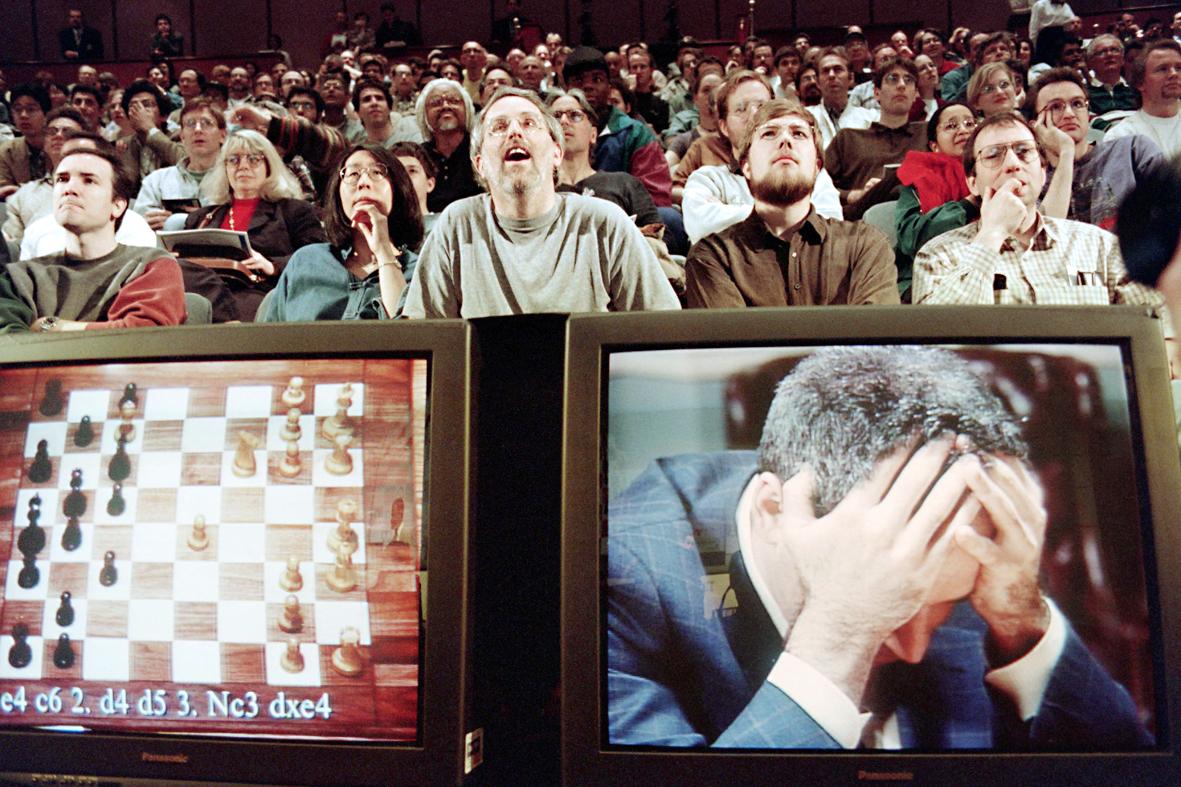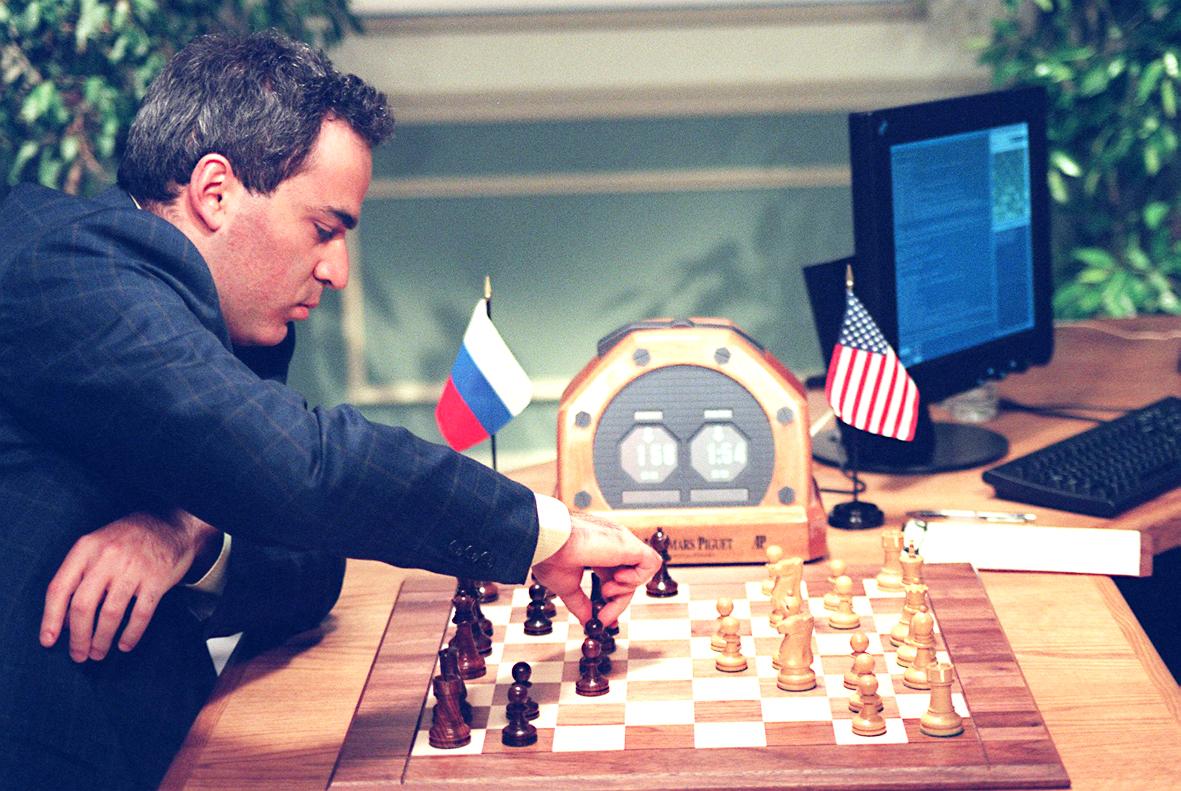With his hand pushed firmly into his cheek and his eyes fixed on the table, Garry Kasparov shot a final dark glance at the chessboard before storming out of the room: the king of chess had just been beaten by a computer.
May 11, 1997 was a watershed for the relationship between man and machine, when the artificial intelligence (AI) supercomputer Deep Blue finally achieved what developers had been promising for decades. It was an “incredible” moment, AI expert Philippe Rolet said, even if the enduring technological impact was not so huge.
“Deep Blue’s victory made people realize that machines could be as strong as humans, even on their territory,” he said.

Photo: AFP
Developers at IBM, the US firm that made Deep Blue, were ecstatic with the victory but quickly refocused on the wider significance.
“This is not about man versus machine. This is really about how we, humans, use technology to solve difficult problems,” said Deep Blue team chief Tan Chung-jen (譚祟仁) after the match, listing possible benefits from financial analysis to weather forecasting. Even Chung would have struggled to comprehend how central AI has now become — finding applications in almost every field of human existence.
“AI has exploded over the last 10 years or so,” UCLA computer science professor Richard Korf said. “We’re now doing things that used to be impossible.”

Photo: AFP
‘ONE MAN CRACKED’
After his defeat, Kasparov, who is still widely regarded as the greatest chess player of all time, was furious.
He hinted there had been unfair practices, denied he had really lost and concluded that nothing at all had been proved about the power of computers. He explained that the match could be seen as “one man, the best player in the world, (who) has cracked under pressure”.
The computer was beatable, he argued, because it had too many weak points. Nowadays, the best computers will always beat even the strongest human chess players. AI-powered machines have mastered every game going and now have much bigger worlds to conquer.
Korf cites notable advances in facial recognition that have helped make self-driving cars a reality. Yann LeCun, head of AI research at Meta/Facebook, said there had been “absolutely incredible progress” in recent years. LeCun, one of the founding fathers of modern AI, lists among the achievements of today’s computers an ability “to translate any language into any language in a set of 200 languages” or “to have a single neural network that understands 100 languages.”
It is a far cry from 1997, when Facebook didn’t even exist.
MACHINES ‘NOT THE DANGER’
Experts agree that the Kasparov match was important as a symbol but left little in the way of a technical legacy.
“There was nothing revolutionary in the design of Deep Blue,” said Korf, describing it as an evolution of methods that had been around since the 1950s. “It was also a piece of dedicated hardware designed just to play chess.”
Facebook, Google and other tech firms have pushed AI in all sorts of other directions.
They have fueled increasingly powerful AI machines with unimaginable amounts of data from their users, serving up remorselessly targeted content and advertising and forging trillion-dollar companies in the process.
AI technology now helps to decide anything from the temperature of a room to the price of vehicle insurance. Devices from vacuum cleaners to doorbells come with arrays of sensors to furnish AI systems with data to better target consumers.
While critics bemoan a loss of privacy, enthusiasts believe AI products just make everyone’s lives easier. Despite his painful history with machines, Kasparov is largely unfazed by AI’s increasingly dominant position.
“There is simply no evidence that machines are threatening us,” he said last year. “The real danger comes not from killer robots but from people — because people still have a monopoly on evil.”

April 28 to May 4 During the Japanese colonial era, a city’s “first” high school typically served Japanese students, while Taiwanese attended the “second” high school. Only in Taichung was this reversed. That’s because when Taichung First High School opened its doors on May 1, 1915 to serve Taiwanese students who were previously barred from secondary education, it was the only high school in town. Former principal Hideo Azukisawa threatened to quit when the government in 1922 attempted to transfer the “first” designation to a new local high school for Japanese students, leading to this unusual situation. Prior to the Taichung First

When the South Vietnamese capital of Saigon fell to the North Vietnamese forces 50 years ago this week, it prompted a mass exodus of some 2 million people — hundreds of thousands fleeing perilously on small boats across open water to escape the communist regime. Many ultimately settled in Southern California’s Orange County in an area now known as “Little Saigon,” not far from Marine Corps Base Camp Pendleton, where the first refugees were airlifted upon reaching the US. The diaspora now also has significant populations in Virginia, Texas and Washington state, as well as in countries including France and Australia.

On April 17, Chinese Nationalist Party (KMT) Chairman Eric Chu (朱立倫) launched a bold campaign to revive and revitalize the KMT base by calling for an impromptu rally at the Taipei prosecutor’s offices to protest recent arrests of KMT recall campaigners over allegations of forgery and fraud involving signatures of dead voters. The protest had no time to apply for permits and was illegal, but that played into the sense of opposition grievance at alleged weaponization of the judiciary by the Democratic Progressive Party (DPP) to “annihilate” the opposition parties. Blamed for faltering recall campaigns and faced with a KMT chair

Article 2 of the Additional Articles of the Constitution of the Republic of China (中華民國憲法增修條文) stipulates that upon a vote of no confidence in the premier, the president can dissolve the legislature within 10 days. If the legislature is dissolved, a new legislative election must be held within 60 days, and the legislators’ terms will then be reckoned from that election. Two weeks ago Taipei Mayor Chiang Wan-an (蔣萬安) of the Chinese Nationalist Party (KMT) proposed that the legislature hold a vote of no confidence in the premier and dare the president to dissolve the legislature. The legislature is currently controlled